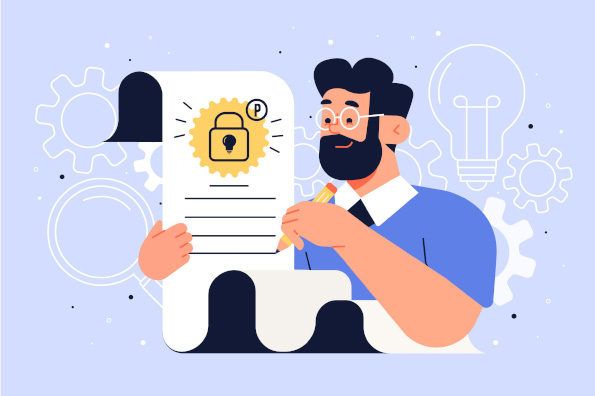Crafting an Effective E-Commerce Privacy Statement: A Step-by-Step Guide
As an e-commerce business owner, protecting your shoppers' privacy should be at the top of your priority list. Not only is it an essential way to...
5 min read
LegalGPS : Oct. 18, 2024
In today’s digital age, human resource (HR) departments handle an enormous amount of sensitive employee data, from personal information and health records to financial details and employment history. Ensuring data privacy in HR management is not just about compliance; it’s about building trust, safeguarding employees' rights, and protecting the organization from significant risks. This guide will cover the importance of data privacy in HR, key regulations you need to know, and best practices for effective HR data management.


Legal GPS Pro
Protect your business with our complete legal subscription service, designed by top startup attorneys.
Employees are more willing to share personal information with their employers if they trust that their data will be handled with care. HR departments often require sensitive data for payroll, health benefits, and performance reviews. When employees are confident that their information is secure, it fosters trust and openness, leading to a more productive work environment.
There are multiple data privacy regulations that HR departments must comply with to avoid legal consequences. Failing to comply with data privacy laws can result in hefty fines, legal liabilities, and damage to the company's reputation. Compliance helps ensure that employee data is collected, stored, and processed lawfully.
HR data, by its nature, is highly sensitive and therefore a prime target for cybercriminals. Protecting data privacy in HR helps mitigate the risk of data breaches and cyberattacks that could expose sensitive employee information, potentially leading to identity theft and other damages.
Data privacy is also about protecting the rights of individuals. Employees have a right to know how their personal information is being used, who has access to it, and how it is being protected. Transparency in data practices helps ensure that employee rights are safeguarded.
The General Data Protection Regulation (GDPR) applies to organizations operating within the European Union (EU) or dealing with data of EU residents. GDPR requires that HR departments handle employee data transparently, collect data only for specified purposes, and implement appropriate security measures to protect it.
Actionable Tip: Obtain explicit consent from employees for processing their personal data. Make sure that the consent is documented and easy for employees to withdraw.
Sample Clause for Employee Privacy Notice: "Your personal data will be collected and processed in accordance with GDPR regulations. You have the right to access, modify, or withdraw your consent regarding the use of your data at any time."
Protect user data with privacy best practices
For companies operating in California or dealing with California residents, the California Consumer Privacy Act (CCPA) imposes strict data privacy obligations. HR departments must inform employees of their rights regarding data collection, access, and deletion.
Actionable Tip: Provide employees with a privacy notice that outlines their rights under CCPA, including the right to know what data is being collected and the right to request deletion.
Sample Clause for Employee Handbook: "In compliance with the CCPA, employees have the right to request information regarding the personal data collected about them and may request the deletion of such data."
For organizations that manage employee health information, HIPAA is crucial. HIPAA regulates how employers handle employee health records and ensures that this information is kept confidential and secure.
Actionable Tip: Limit access to employee health information to only those HR personnel who need it for specific, approved purposes.
Sample Provision for Data Access Policy: "Access to employee health information is restricted to authorized HR personnel only. All access will be logged and monitored to ensure compliance with HIPAA."
Not every member of the HR team needs access to all employee data. Role-Based Access Control (RBAC) ensures that access to personal information is limited based on job responsibilities, reducing the risk of unauthorized data exposure.
Actionable Tip: Create a detailed access control matrix that outlines which HR roles can access specific types of employee data. Review and update access rights periodically.
Sample Policy Clause: "Access to employee data is granted based on role-specific requirements. Unauthorized access or sharing of data is strictly prohibited and may lead to disciplinary action."


Legal GPS Pro
Protect your business with our complete legal subscription service, designed by top startup attorneys.
To protect sensitive data from unauthorized access, HR departments must use encryption for data at rest and in transit. Encrypting data ensures that even if it is intercepted or accessed unlawfully, it cannot be read without the encryption key.
Actionable Tip: Ensure that all employee data, whether stored on servers, in the cloud, or in transit, is encrypted using strong encryption standards.
Sample Provision for Data Security Policy: "All employee data must be encrypted using industry-standard encryption protocols, both at rest and during transmission."
HR personnel must be well-versed in data privacy practices and regulations. Regular data privacy training ensures that HR staff are aware of how to handle employee information securely and how to recognize potential threats.
Actionable Tip: Conduct quarterly data privacy training sessions that cover relevant regulations (e.g., GDPR, CCPA) and best practices for handling sensitive employee data.
Sample Training Requirement: "All HR staff must complete mandatory data privacy training within their first month of employment and attend quarterly refresher sessions."
Data minimization is the practice of collecting only the personal data necessary for a specific purpose. This reduces the risk associated with storing large volumes of sensitive data.
Actionable Tip: Review HR data collection forms to ensure that only essential information is being requested. Avoid collecting data that is not directly relevant to HR functions.
Sample Clause for Data Collection Policy: "Employee data collection will be limited to information that is strictly necessary for HR processes, such as payroll, benefits administration, and compliance."
Keeping an audit trail of who accessed employee data and when can help identify unauthorized access and ensure compliance with data privacy regulations. Regular audits provide transparency and accountability.
Actionable Tip: Use software that logs all access to sensitive employee data and schedule regular audits to review access logs.
Sample Audit Policy: "An audit trail will be maintained for all access to employee data, including the identity of the individual accessing the data, the date, and the purpose. Regular audits will be conducted to verify compliance."
One of the challenges in HR data privacy is balancing transparency with privacy. Employees have the right to know how their data is used, but over-disclosing information may lead to confusion or unnecessary concern.
Solution: Provide clear, concise explanations of data practices in employee handbooks and privacy notices, and ensure employees have a point of contact for privacy-related questions.
HR departments often work with third-party vendors for payroll, benefits administration, and other services. Ensuring these vendors also comply with data privacy regulations is crucial.
Solution: Conduct due diligence on third-party vendors to ensure they adhere to data privacy standards. Include data protection clauses in vendor contracts.
Sample Clause for Vendor Contract: "Vendor agrees to comply with all applicable data privacy laws and implement adequate security measures to protect employee data shared by [Company Name]."
Even with the best precautions, data breaches can happen. Having a data breach response plan is essential to minimize the impact on employees and the organization.
Solution: Develop a detailed data breach response plan that includes steps for notifying affected employees, mitigating the breach, and preventing future incidents.
Sample Data Breach Response Clause: "In the event of a data breach involving employee information, [Company Name] will notify affected individuals within 72 hours and take all necessary steps to mitigate the impact of the breach."
Data privacy is a critical component of HR management. By understanding key regulations like GDPR, CCPA, and HIPAA, and implementing best practices such as role-based access control, encryption, and regular training, HR departments can effectively protect sensitive employee data. Prioritizing data privacy not only ensures compliance but also builds trust with employees, reduces risks, and strengthens the organization as a whole.
The biggest question now is, "Do I need a business lawyer?” For most businesses and in most cases, you don't need a lawyer to start your business. Instead, many business owners rely on Legal GPS Pro to help with legal issues.
Legal GPS Pro is your All-In-One Legal Toolkit for Businesses. Developed by top startup attorneys, Pro gives you access to 100+ expertly crafted templates including operating agreements, NDAs, and service agreements, and an interactive platform. All designed to protect your company and set it up for lasting success.

Legal GPS Pro
Protect your business with our complete legal subscription service, designed by top startup attorneys.

100+ legal templates, guides, and expert advice to protect your business.
Trusted by 1000+ businesses

As an e-commerce business owner, protecting your shoppers' privacy should be at the top of your priority list. Not only is it an essential way to...

Capturing website visitor information has become a common practice, but it comes with significant legal responsibilities. Over the years, “data...

Blogging has become a popular way to share information, build communities, and even generate income. However, the nature of blogs being publicly...